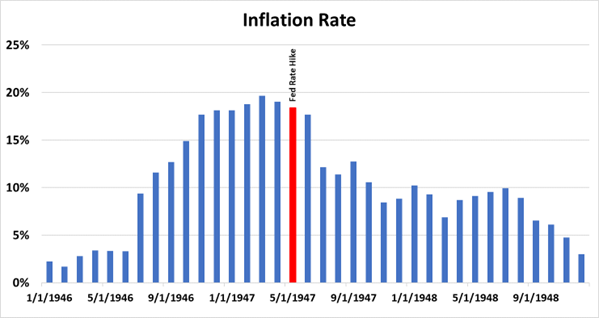Are you worried about rising interest rates? Here’s why you shouldn’t be! [Wednesdays: The Independent Investor]

Miles Everson’s Business Builder Daily speaks to the heart of what great marketers, business leaders, and other professionals need to succeed in advertising, communications, managing their investments, career strategy, and more.
A Note from Miles Everson:
Hello!
We’re thrilled to share with you another investing insight in today’s “The Independent Investor.”
Every Wednesday, we publish articles about investing because we want to help you achieve true financial freedom through wealth creation.
In this article, we’ll talk about one of the measures that the U.S. Federal Reserve uses to stabilize an economy that’s experiencing high inflation.
Continue reading below to know more about this topic and how one of the Fed’s monetary policies can impact your investments.
Miles Everson
CEO, MBO Partners
Chairman of the Advisory Board, The I Institute
The Independent Investor
For the past several months, investors, corporations, and observers have been on the constant lookout for changes in the interest rates of the U.S. This is because the Federal Reserve, a.k.a. the Fed, has raised interest rates by 25 basis points for 10 consecutive times since March 17, 2022.
What actually happens when interest rates go up or down?
When there’s an increase in interest rates, borrowing costs more for both businesses and consumers, and this leads to a decline in spending.
A decrease in consumer spending means lower business earnings. When this happens, stock prices tend to drop.
On the other hand, if interest rates are lowered, borrowing becomes easier and spending goes up, leading to an increase in both profits and stock prices.
Based on the explanation above, it’s understandable why investors have been on the lookout for changes in interest rates. However, should they worry about this?
To answer that question, we need to dive deeper about the topic at hand…
Central banks like the Fed are bound to step in whenever a country is experiencing high inflation and prices. One of the tools these institutions have at their disposal is the ability to raise interest rates.
By raising interest rates, central banks can reduce the amount of money circulating in the economy because businesses and individuals are discouraged from borrowing. When this happens, demand goes down since people are less likely to avail loans and spend more money.
In theory, this simple act is seen as a way to cool down an economy that’s running too hot… but does it actually work?
Yes!
According to Professor Joel Litman, Chairman and CEO of Valens Research and Chief Investment Officer of Altimetry Financial Research, interest rate hikes were one of the tools the Fed used in 1947 to help cool down rampant inflation in the U.S in just a year. You can see the result in the graph below.

Photo courtesy of Altimetry
Fast forward to today, the Fed is doing the same thing—cooling down inflation by raising interest rates.
This brings us back to our previous question: Should investors worry about this central bank tool?
The answer is NO. The increase in interest rates isn’t really a bad thing because it enables the Fed to address high inflation. While it’s true that this measure could lead to stock price decline, this shouldn’t worry investors that much nor lead them to make emotionally-driven investment decisions.
Instead of worrying, investors can do the following:
- Carefully assess the market for stocks that have low valuations but have the potential to climb in price over time.
- Study the balance sheets of the firms they plan to invest in. Financial statements are one of the signals that will tell an investor whether a stock is worth buying or not.
- Pay close attention to other opportunities. During an interest rate hike, some investments like short-term bonds tend to perform better.
Keep these tips in mind every time the Fed raises interest rates!
Economic measures such as the one we discussed have the potential to significantly affect the stock market. However, if you do your due diligence and keep your emotions in check, you’ll be able to protect, and even improve, your investment portfolio regardless of the economic situation.
Happy mid-week!
(This article is from The Business Builder Daily, a newsletter by The I Institute in collaboration with MBO Partners.)
About The Dynamic Marketing Communiqué’s
“Wednesdays: The Independent Investor”
To best understand a firm, it makes sense to know its underlying earning power.
In two of the greatest books ever written on investing, the “Intelligent Investor” by Benjamin Graham and “Security Analysis” by David Dodd and Benjamin Graham (yes, Graham authored both of these books), the term “earning power” is mentioned hundreds of times.
LITERALLY.
Despite that, it’s surprising how earning power is mentioned seldomly in literature on business strategy. If the goal of a business is wealth creation, then the performance metrics must include the earning power concept.
Every Wednesday, we’ll publish investing tips and insights in accordance with the practices of some of the world’s greatest investors.
We make certain that these articles help you identify and separate the best companies from the worst, and develop your investing prowess in the long run.
Our goal?
To help you get on that path towards the greatest value creation in investing.
Hope you’ve found this week’s insights interesting and helpful.
Stay tuned for next Wednesday’s “The Independent Investor!”
Cheers,
Kyle Yu
Head of Marketing
Valens Dynamic Marketing Capabilities
Powered by Valens Research
www.valens-research.com




